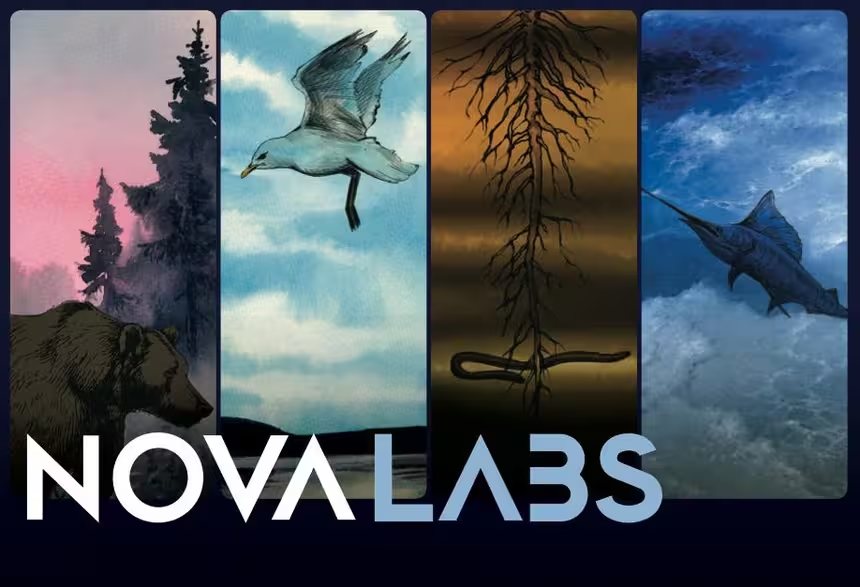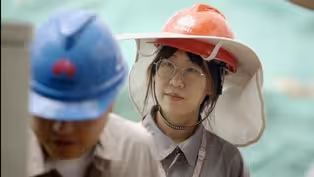
How 5G Is Transforming China
Clip: Season 50 Episode 16 | 4m 28sVideo has Closed Captions
A tech war between China and the West is starting to heat up.
China is betting big on 5G, deploying the technology at a greater scale than any other place in the world.
Problems playing video? | Closed Captioning Feedback
Problems playing video? | Closed Captioning Feedback
National Corporate funding for NOVA is provided by Carlisle Companies and Viking Cruises. Major funding for NOVA is provided by the NOVA Science Trust and PBS viewers.

How 5G Is Transforming China
Clip: Season 50 Episode 16 | 4m 28sVideo has Closed Captions
China is betting big on 5G, deploying the technology at a greater scale than any other place in the world.
Problems playing video? | Closed Captioning Feedback
How to Watch NOVA
NOVA is available to stream on pbs.org and the free PBS App, available on iPhone, Apple TV, Android TV, Android smartphones, Amazon Fire TV, Amazon Fire Tablet, Roku, Samsung Smart TV, and Vizio.
Buy Now

NOVA Labs
NOVA Labs is a free digital platform that engages teens and lifelong learners in games and interactives that foster authentic scientific exploration. Participants take part in real-world investigations by visualizing, analyzing, and playing with the same data that scientists use.Providing Support for PBS.org
Learn Moreabout PBS online sponsorship- [Narrator] China is deploying 5G at a scale greater than any other place in the world.
- China's exceptionally good at developing infrastructure, whether it's, you know, 5G infrastructure, or electric grid infrastructure, or electric vehicle charging infrastructure, it has this ability to do good planning and then also to execute.
- [Narrator] What I've seen in China is 5G completely changing the way people live and work.
Even in seemingly low tech traditional industries, across the country, more than two and a half million people are employed in coal mining.
It's dangerous work known for frequent accidents and fatalities.
- [Translator] This is the main shaft of the mine.
It's a dark place with thick air.
It's also the most dangerous place in the mine.
- [Narrator] One of the problems is the inability to control machinery remotely.
It's impractical to connect using wires, meaning workers have needed to be perilously close to their machines at all times.
5G is capable of bringing digital connections into deep underground crevices, such as this one, allowing the facility to become completely automated.
Previous 4G systems beamed data inefficiently in all directions, 5G is much more precise.
- We can make beams simultaneously, that can be a little sliver going this way or we can have a little sliver that way, or we can have multiple ones that way, or multiple ones this way, and it can extend the distance or it can provide more capacity or it can follow somebody or something.
- [Narrator] China says its goal is to ultimately move away from coal and into cleaner forms of energy.
5G is a critical part of this plan as well.
(bright music) This is the Dingzhuang floating solar farm, across a large swath of sea are endless solar panels each requiring monitoring.
The plant's expected total output is 550 million kilowatt hours per year, that's enough to power 52,000 typical American homes.
- You have tens of thousands of photovoltaic cells, and 5G can monitor information from them more efficiently than anything else can.
(alarm blaring) - [Narrator] China's national 5G infrastructure gives a built-in advantage to this large scale solar farm.
Solar panel technology is prone to malfunctions and one problematic panel can shut down an entire grid.
5G enables each panel to constantly send data to a central command station making inspections more efficient and saving labor costs.
And a solar farm can scale to a size that wouldn't be possible otherwise.
- I can now monitor them to see whether they're failing or when they're going to fail, so I can optimize that prediction of maintenance for these farms.
- [Narrator] And there's another unexpected benefit here.
The shade from the solar farm actually cools the surrounding water, helping create an ideal environment for farming shrimp and other seafood.
But all of this is possible because the Chinese government sees the advantage of creating a web of connectivity across the entire country and is willing to use its central authority to make it a reality.
- 5G cellular technology is really sort of a major leap and it really is more of the high tech future that we've seen in the movies and in sci-fi, in which we're surrounded all the time by, you know, really high speed data and the ability to exploit all of that.
- And that just basically means 5G will enable much more precision-based applications.
- [Narrator] Driverless cars, automated ports and factories, next generation AI, what all of these things have in common is that they can't fully develop until 5G infrastructure is built.
And as with most new infrastructure, we don't yet know how it will change society for better or worse.
(people chattering)
Inside China's Tech Boom Preview
Video has Closed Captions
Preview: S50 Ep16 | 30s | The inside story of China’s meteoric rise to the forefront of global innovation. (30s)
Inside Huawei: China’s Tech Giant
Video has Closed Captions
Clip: S50 Ep16 | 3m 40s | Working at Huawei can be intense - six day weeks and 12 hour days are the norm. (3m 40s)
Providing Support for PBS.org
Learn Moreabout PBS online sponsorship
- Science and Nature

Capturing the splendor of the natural world, from the African plains to the Antarctic ice.













Support for PBS provided by:
National Corporate funding for NOVA is provided by Carlisle Companies and Viking Cruises. Major funding for NOVA is provided by the NOVA Science Trust and PBS viewers.




